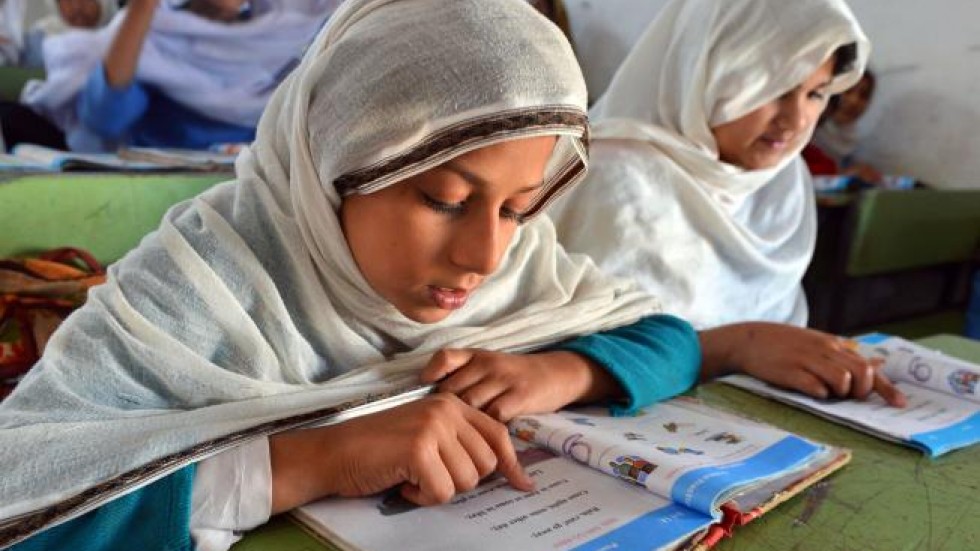
Nearly five years on, the Pakistan Tehreek-e-Insaf (PTI)-led government is claiming to have turned around the elementary and secondary education sector, particularly in 2017.
They got more children into schools — especially from private schools into government schools, outfitted schools with essential items such as benches and chairs along with boundary walls and even stipend for children to attend schools.
Even as that may be, there are still 1.5 million children across Khyber-Pakhtunkhwa (K-P) who are not in schools while hundreds of schools are still without basic facilities.
According to the K-P Elementary and Secondary Education Department’s out-of-school children survey (conducted in 2016) a total of 1.52 million children across the province were still not in school. Of these, a majority were girls at 1.02 million girls and 504,952 boys.
Moreover, K-P’s Independent Monitoring Unit (IMU) in a November 2017 report showed that as many as 16 per cent of schools in the province are still without clean drinking water, another five per cent lack toilets, 23 per cent are without power and five per cent are without boundary walls.
The official documents stated that the K-P ESED was creating a new narrative which revolves around systemic education reforms by removing barriers to quality education and expanding access to the children who were left behind by the under-resourced education infrastructure.
It stated that to ensure quality education in the province over 40,000 teachers were recruited on merit and raised the student-teacher ratio to 40::1. Moreover, 80,000 teachers have been trained to use English as a medium of instruction while 45,000 teachers were currently undergoing training on the use of phonetics to learn English language.
To do this, the government earmarked Rs800 million for professional development activities in the fiscal year 2017-18.
The documents further showed that the government was in the middle of a programme to reform textbooks to develop content which is in line with the needs of the 21st century. In the initial phase of this programme, textbooks for grades one through five were revised and redesigned in accordance with the approved standard of textbook development.
To provide uniform and universal primary education for all, assessments were made mandatory for all students — regardless of the fact that they hailed from the public or private school systems. Similarly, in 2018, the ESED is aiming to conduct eighth-grade assessment while continuing with the assessment cycle at the fifth-grade level.
It noted that since 2013, over Rs29 billion has been invested in providing these facilities to schools. Moreover, over 415,000 students were provided with stipends under the ‘girls’ stipend programme’ (GSP) across 23 districts of the province to ensure that they do not drop out of government schools owing to economic hardships.
Voucher scheme
In another initiative to keep children in school, the Elementary Education Foundation (EEF) launched the Iqra Farogh-e-Taleem Education Voucher Scheme (EVS).
This joint public-private partnership programme saw the EEF join hands with selected private schools to provide access to education to out-of-school children. The programme has so far reached 50,000 poor students.
More funds
To address the education emergency, the government realised that it would require a substantial amount of money. Hence ESED’s budget saw an upward graph for the past four years. In 2013-14 the total budget allocated was Rs64 billion. This was raised to Rs88 billion in 2014-15, Rs99.4 billion in 2015-16, and Rs118.7 billion in 2016-17.
Even with the creation of the local government, the budget allocated for education by the provincial government had more than doubled to Rs136.194 billion by the fiscal year 2017-18.
The documents showed that K-P is the only province which has allocated such a large chunk of its budget for the education sector in line with the Sustainable Development Goals (SDGs) of United Nations on education.
Infrastructure development
Additionally, the ESED built 1,350 computer labs in schools to reduce the gap between private and public schools. Around 100 schools were also provided with Interactive boards to advance learning skills of students.
To encourage extracurricular activities amongst students, the ESED set up 10,000 play areas and over 140 sports grounds in schools.
The teachers were also rewarded under an incentive programme to improve their performance.
Under this scheme, over 4,700 top performing teachers were given cash prizes. Since 2015, Rs275 million has been disbursed under the scheme.
To improve the creative skills of students, the ESED distributed over 5.1 million drawing books among K-P’s students. A School Quality Management Initiative (SQMI) was also set up to monitor the quality of teaching in schools this year.
Quranic Education (Nazra) was made mandatory in government schools, while over 12,000 additional classrooms were built in 2017.
Published in The Express Tribune, January 3rd, 2018.




1730959638-0/trump-(19)1730959638-0-165x106.webp)






COMMENTS
Comments are moderated and generally will be posted if they are on-topic and not abusive.
For more information, please see our Comments FAQ